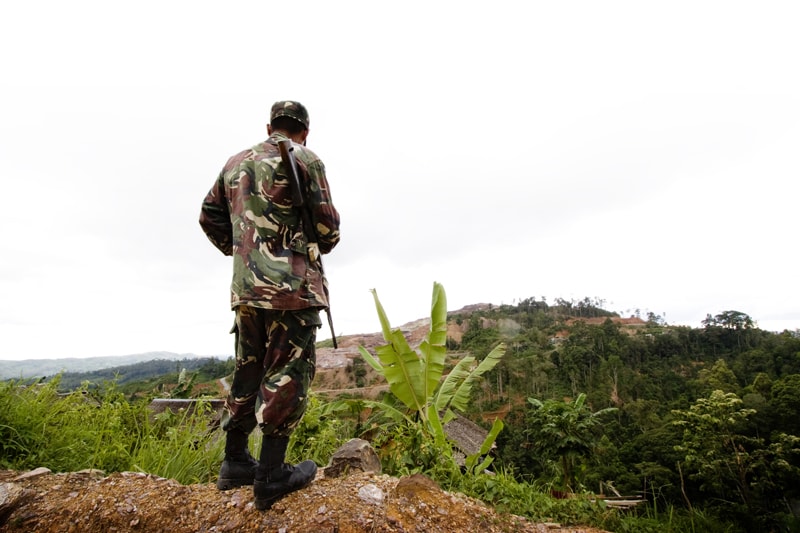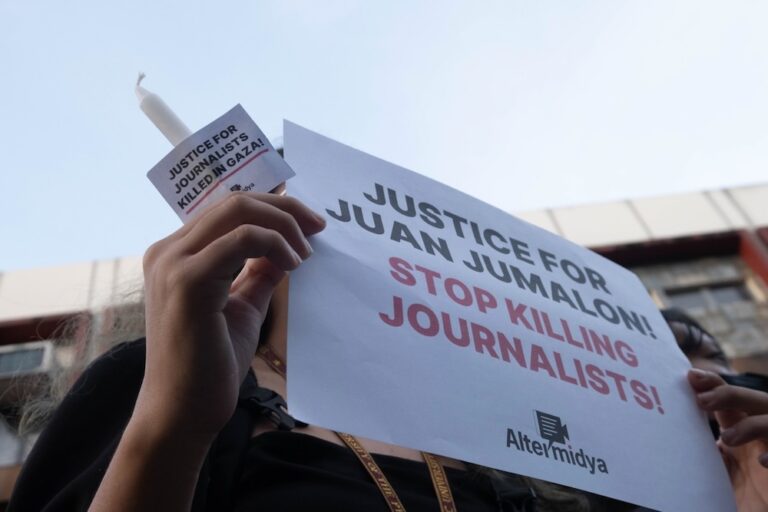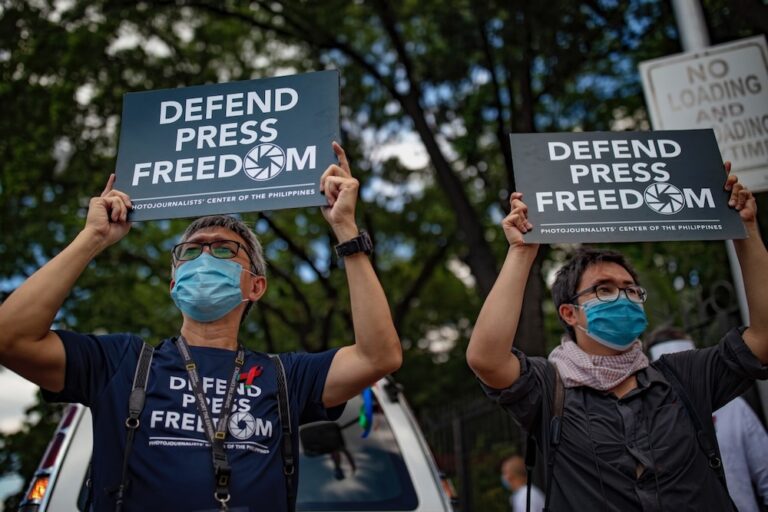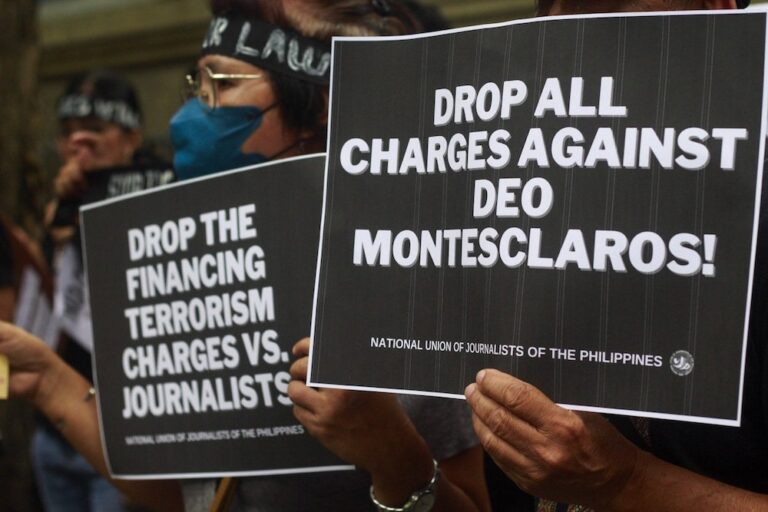Activists, indigenous rights groups and journalists in the Philippines have been targeted for exposing and criticising mining and other environmental abuses for years.
In September 2012, Jordan Manda, an 11-year old boy on his way to school, wearing his Boy Scout uniform, was shot dead in an ambush by armed men in resource-rich Mindanao, southwest Philippines. Jordan was the son of Timuay Locencio Manda, a community leader opposed to the further development of a gold and copper mine in the region.
Manda had been protesting against widening mining operations by TVIRD, the Philippine affiliate of a Canadian-based mining company, TVI Pacific (TVI) in Canatuan, Zamboanga del Norte, Mindanao. He was leading the claim of the Subanen indigenous community for protection of their sacred ancestral domain around Mount Canatuan since his cousin was assassinated in 2002. For years, the family has refused to issue the community’s consent to various mining and logging companies on their ancestral lands.
The local police had labelled Manda an “illegal” mining activist in an attempt to discredit and silence him, according to testimony before a Canadian parliamentary committee. Neri Colmenares, member of the Philippines’s House of Representatives and a human rights lawyer, complained to the Canadians, “Not only was there another attempt on the life of an environmental activist, not only is this another example of repression on indigenous people, but an innocent child was also killed in the process.”
Mining, particularly gold and copper mining in Mindanao, is key to the government’s development strategy. In 2011, Jerry Treñas, member of the Philippine government and chair of the House Committee on Good Government and Public Accountability, said that Mindanao may have untapped minerals worth between US$840 billion to US$1 trillion. He claimed that the deposits in Mindanao “could catapult the entire nation from being a third world nation into a major economic power in Asia.”
According to the Mining Association of Canada, mining contributed $35.6 billion to Canada’s gross domestic product in 2011 and over $9 billion in taxes and royalties. Canadian stock markets are the largest source of capital for mining operations around the world.
The military and the police have denied involvement in Jordan’s killing, and TVIRD has condemned it. However, attacks on environmental advocates and their families – often at the hands of security forces – are not uncommon in the Philippines. In October 2012, soldiers of the 27th Infantry Battalion shot at the house of indigenous activist Dagil Capion in South Cotabato, a province in southern Mindanao. The government had labelled Capion an “enemy of the state” for his actions against the mining operations of another company, Xstrata-SMI. Capion escaped but his pregnant wife and two young sons were killed.
Activists, indigenous rights groups and journalists have been targeted for exposing and criticising environmental abuses for years. Under the previous government of Gloria Macapagal Arroyo, 36 environmental activists were murdered, and another two were disappeared, according to Kalikasan, a Philippine network of environmental and people’s rights groups.
Not much has changed under President Benigno Aquino, in power since June 2010. Aquino promised to deliver swift justice for families of victims. But his programme of reforms has only served to perpetuate impunity and abet attacks against activists. According to church leaders and human rights activists, Aquino’s “people-centered” and “whole-of-nation” approach to counterinsurgency is just as brutal as “Arroyo’s notoriously failed” programme. Karapatan observed, “There are still incidents of bombings and indiscriminate firing, the use of schools, chapels, medical facilities and other public places for military purpose. People are still forced to leave their homes because of military atrocities in their communities.”
Seven community and church leaders leading environmental campaigns in Mindanao have reported continuing harassment by military agents. Indigenous groups claim that at least 30 indigenous peoples have become victims of extrajudicial killings in the Philippines under the Aquino government and others are increasingly afraid. A complaint about the killings has been submitted to James Anaya, the UN Special Rapporteur on the rights of indigenous peoples.
The conflict over the TVI mine in Canatuan, which dates back 20 years, centres on a claim that it is destroying a sacred Subanen site. The destruction of Canatuan reflects “the utter disrespect of TVI for indigenous customs and traditions,” said Timuay Jose “Boy” Anoy, leader of a local Subanen assembly (“Timuay” means “leader” in Subano, and Anoy is not related to Manda). TVI claims that the mountain is not sacred because it is not among the sites in the heritage inventory of the National Historical Institute.
There are also environmental concerns. Canatuan is already severely denuded from indiscriminate and unregulated logging. Although indigenous people’s presence in the area has preserved some of the land, open-pit mining threatens what’s left of the river and forest. In August 2012, the month before his son was killed, Timuay Manda had joined Catholic bishops and concerned groups in filing a writ to protect one of the remaining tracts of forest in Zamboanga Peninsula. Several mining companies had already put in applications to develop the same areas.
According to villagers’ testimony before British parliament, members of the community, including children, have developed sores and rashes on their skin around TVI’s site at Mount Canatuan. Local fishermen have also told a Catholic news source that they have been catching fewer fish because the river is now so polluted (“Subanen” means “river people”).
Indigenous communities in the Philippines have a series of rights protected nationally and internationally under the principle of “Free, Prior and Informed Consent”. The Philippines, as a signatory to the United Nations’ Declaration on the Rights of Indigenous Peoples in 2007, has committed itself to the promotion of this principle in domestic law. Along with their right to peacefully speak out, communities have a right to say “yes” or “no” to developments that directly affect their lives and livelihoods. So how does TVI, along with the Philippine and Canadian governments, suppress these rights, as well as general reporting of developments around Canatuan?
The Philippine government has often explicitly or implicitly linked activism with terrorism, and suppressed it through anti-terrorist measures. To protect government offices and strategic investments from insurgents, the government has been known to hire private militias, such as Special Civilian Armed Auxiliary (SCAA) units. Under Executive Order 546, Arroyo had endorsed paramilitary units as “force multipliers” in counterinsurgency operations. A spike in killings of environmental activists in 2005-6 coincided with the peak of Arroyo’s counter-insurgency programme.
Aquino, for his part, committed to “neutralising” these groups and revoking the order, but, according to Human Rights Watch, he has taken no steps towards dismantling the paramilitaries. In fact, last year, Aquino issued another order allowing paramilitary groups to be used by transnational corporations to protect their operations. According to testimony given to local NGOs, nine journalists and two human rights advocates were harassed in July 2012 by private militia hired by TVIRD as they attempted to verify reports of the demolition of houses near an expansion site. By the end of 2012, Karapatan had documented 137 incidences of extrajudicial killings under the Aquino government.
The mining companies have used other tactics as well. TVI has threatened community supporters with legal action for reporting on the conflict. Canadian NGO MiningWatch, has been issued threatening letters by TVI’s Toronto-based lawyers.
Social media is also under scrutiny. Last November, a 62-year-old anti-mining activist in Cagayan Province was arrested for a Facebook post that condemned a local mayor for harassing community leaders planning an anti-mining protest.
Filipino church leaders are asking for reform of the Mining Code – the legislation that liberalised the mining sector, causing a rush of foreign investment and control, including investments by TVI. They claim that Canada had much influence over the shape of the code. The Canadian government, for its part, has been actively defending TVI through its embassy in Manila, arguing to both the Philippine government and Filipino church leaders that TVI is a responsible miner, despite the grave abuses reported against the company.
Concerns of the people of Mindanao are already under-reported, according to the Center for Media Freedom & Responsibility. Mining and environmental issues get scant attention, and actions taken against the media and community by groups like the SCAA and TVI make the reporting situation near impossible. Community groups can’t make themselves heard, especially when their future is at stake. And their rights are more easily trampled – sometimes with tragic consequences.
Back in Canatuan, an 11-year-old is dead. Manda has had to move his wife and two other children out of their ancestral land to safety. “To set the record straight, I am not anti-mining,” said Manda. “I am calling the attention of those who mine, of those who are planning to mine in our ancestral lands without valid or legal documents, to stop now. You only bring trouble in our peaceful community and destruction to our environment.”
John Lewis is a Toronto-based human rights advocate and educator.



